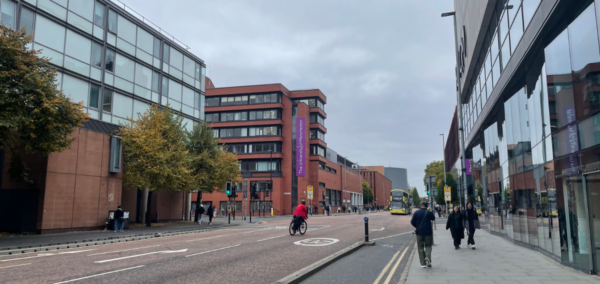
Lawyer’s behaviour to Glasgow student rape victim found to have broken professional conduct
Ellie Wilson’s complaint found that Mr Alonzi’s behaviour had ‘repeatedly crossed the line’
A former University of Glasgow student who was raped while at university has complained about a lawyer’s behaviour towards her in court.
Ellie Wilson changed the law after she won a battle to get applicants to declare any violent criminal charges when going to university, following being raped by her ex-boyfriend.
Mr Alonzi’s behaviour towards Ellie during the trial in 2022 was found to have amounted to unsatisfactory professional conduct on six of the 11 issues raised, BBC reports.
Daniel McFarlane was convicted of two charges of rape, of which took place between December 2017 and February 2018 during the time he was a medical student at the University of Glasgow.
McFarlane was sentenced to five years in prison in June 2022 at the High Court in Glasgow.
Following the trial, Ellie said that the case had left her feeling “completely devastated” and crowdfunded the necessary £3,000 to access the transcripts of the court proceedings, before launching an official complaint about the defence advocate.
The 26-year-old claimed that during questioning, Mr Alonzi had failed to comply with rules designed to protect women in rape trials from inappropriate questioning about their sexual history and character.
The Faculty of Advocates complaints committee found that the lawyer’s behaviour had amounted to unsatisfactory professional conduct on six of the 11 issues raised and that he had “repeatedly crossed that line even after several fairly lengthy exchanges with the trial judge”.
It was determined that the repeated nature of his conduct was beyond what could be considered excusable or inadvertent.
Most Read
After campaigning publicly about her assault, including visiting the University of Glasgow to deliver a talk to students on the new Scottish policy regarding declaration of crimes, Ellie waived her anonymity and hoped the finding would set a precedent and show that advocates “can’t act with impunity”.
During the trial in 2022, the judge had intervened on one occasion after Mr Alonzi asked Ellie whether she had heard of narcissistic personality disorder and if she had it, to which she replied that she did not.
The committee for complaints found that this probe without context of having seen a report or diagnosis by a properly qualified medical professional was “discourteous to the court and abused the privileged position” held by Mr Alonzi.
Mr Alonzi was also found to have deliberately referred to matters that had been ruled inadmissible, despite knowing that the trial judge would likely be forced to direct the jury to disregard them.
After McFarlane had received the guilty veridict, Mr Alonzi told the court that it was “difficult not to imagine some sense of injustice in it all”, and that his client didn’t belong in court. He also claimed that his client “fell in love with the wrong person”.
It has been determined by the committee that the remarks were inappropriate and should not have been made by the defence lawyer, including that they implied that the jury made an error and convicted an innocent man.
Ellie claimed that Mr Alonzi’s comments were laced with misogyny, saying: “I think they were designed to break me down.
“I think they were designed to poison the minds of the jury and I think they were awful and they should never have been said.
She added that she hoped the committee’s findings would act as a warning to all advocates and prevent further victims from going through the same thing.
Ellie said: “I didn’t want anyone else to go through what I went through.
“I didn’t want them to go through it at the hands of Lorenzo Alonzi or anyone else so I really hope that others don’t have to suffer in the way that I did.
“We talk about why victims don’t come forward… because they know they are going to face such a brutal court experience.”
Sandy Brindley, from Rape Crisis Scotland, said that defence lawyers’ conduct can often be a significant cause of distress and trauma. She said: “It’s crucial that their conduct is always appropriate.
“It is entirely possible to test evidence rigorously and protect the accused’s right to a fair trial while treating complainers with respect and dignity. Improvements must be made to complaints processes which are currently lengthy and inaccessible”
The Scottish government said it recognised flaws within the current legislation around the regulation of legal services and complaints, explaining that it is “complex and dated”.
The penalty imposed on Mr Alonzi is yet to be decided by the complaints committee, but could range from a written warning to an order for compensation to be paid to the Complainer, not exceeding £3,000.
Mr Alonzi has been contacted for comment.
Related articles recommended by this author:
• Glasgow University rape survivor urges uni to introduce mandatory consent classes for freshers
• Glasgow Uni rape survivor gave empowering talk to students after changing Scottish policy
• Glasgow student drives ambulance 3,000 miles to Gaza to assist humanitarian relief efforts
Featured image via X @ellieokwilson



















